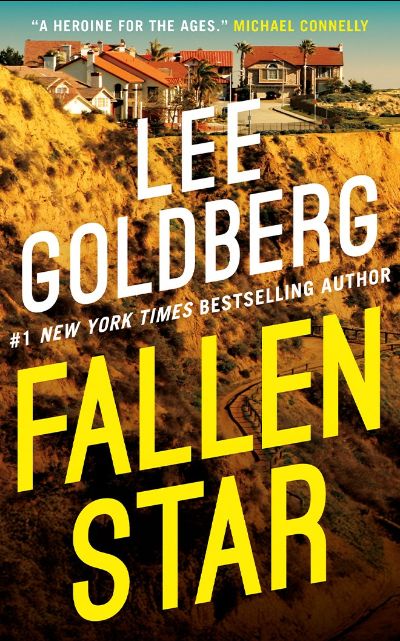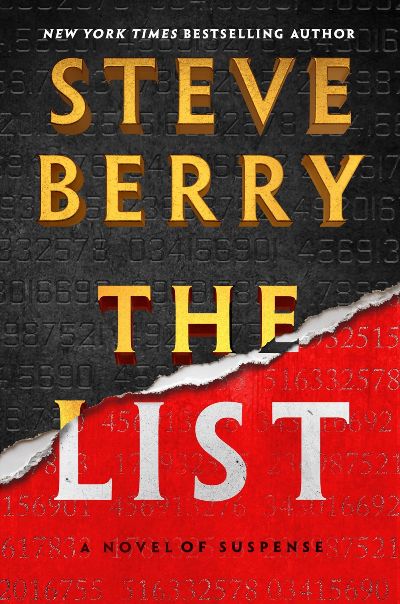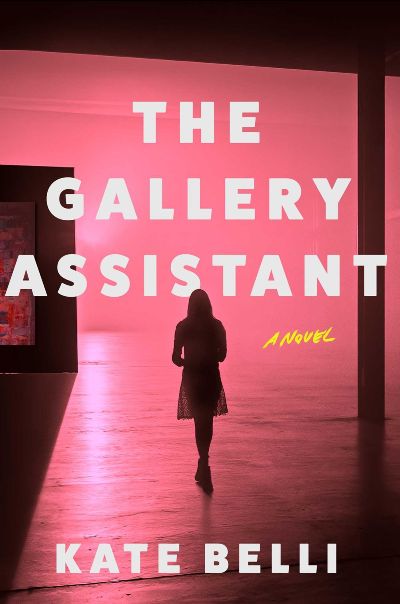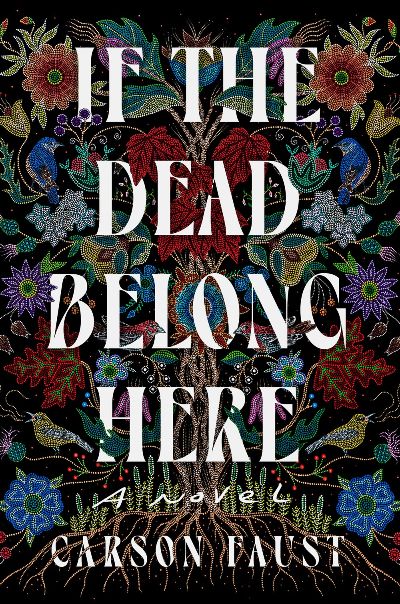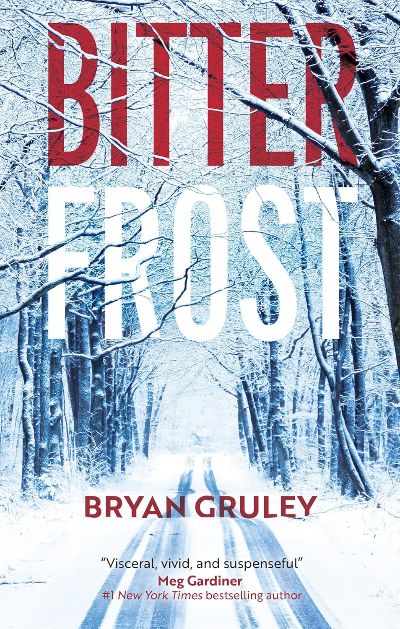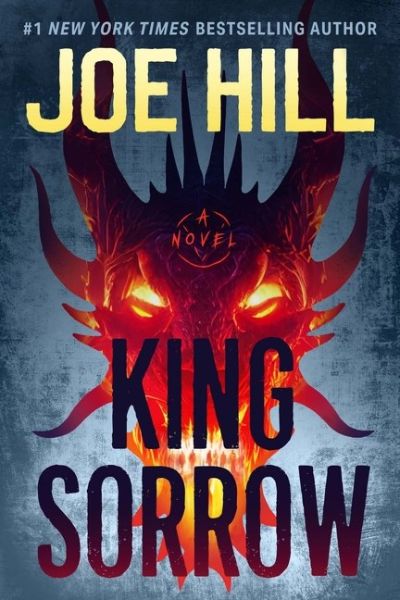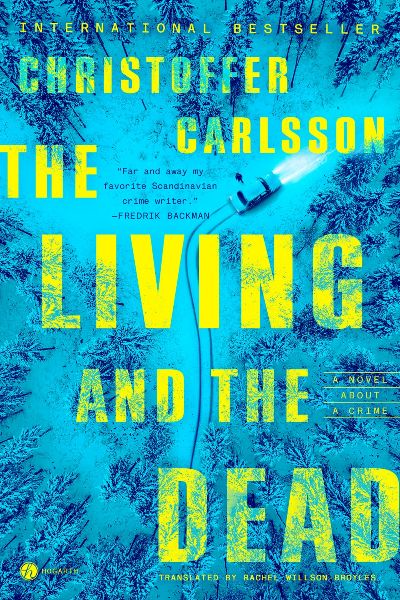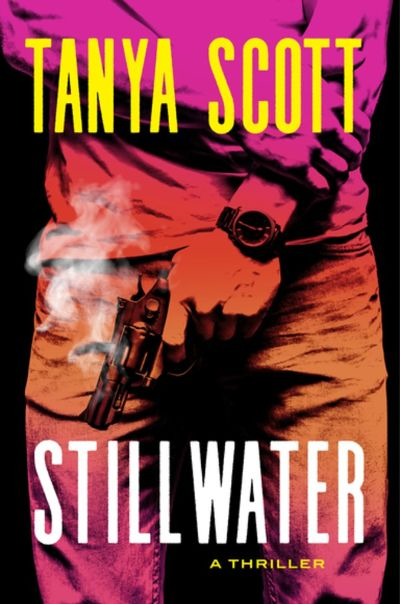Los Angeles Detective Eve Ronin uses an unorthodox method to stop a robbery while off duty, putting her in the boss’s crosshairs in Goldberg’s (Dream Town, Calico, Malibu Burning, Ashes Never Lie) latest. Eve is torn between her celebrity status from having a TV show based on her “life” and the higher-ups who want her to leave. Even a suspension is temporary when videos of Eve stopping the robbery go viral and a dead body is discovered in a metal drum. Her life and the case escalate when one of the suspects has a vendetta against her. Add corruption inside her own department and a helicopter crash that hits literally too close to home, and she barely has time to breathe. Eve must balance her pursuit of justice and be on her best behavior since one false move could mean the end of her career, even if she’s the most famous detective in Los Angeles. Readers will love Goldberg’s dive into Eve’s world and the quirky aspects of Los Angeles life as well as the continuing story (Goldberg even throws in an extensive cameo featuring featuring his other series characters). Whether Fallen Star is your first time reading Eve or your sixth doesn’t matter. In either case, Goldberg has done it again with a compelling and complex mystery.
Thrillers
Berry delivers a novel unlike anything he’s ever done before. Rather than exploring history, this one takes pieces of John Grisham’s The Firm and mixes them with the business aspects of a Joseph Finder novel and storytelling elements from David Baldacci. Brent Walker left his hometown and the woman he loved ten years ago, and now he’s come back to help his sick mom. He takes a job at the small-town paper mill in a legal role beneath his level of expertise to oversee their negotiations with the local union. The company’s management is not trustworthy, and more than doctoring the financials, they have created a list, and the purpose of the names on it is beyond reprehensible. Brent and his lifelong friend and co-worker, Hank, are given a series of what appear to be random numbers, but research reveals to them the horrendous nature of what the numbers mean. They are not random at all, but to say anything more would spoil the fun. Someone given the pages without knowing the author’s identity would never identify Berry as this book’s writer, and his going outside his comfort zone to resurrect one of his early, desk-drawer novels is beneficial to him, his fans, and thriller readers alike. The List would be a perfect story to be turned into an Alfred Hitchcock film, and this should only add to Berry’s fanbase.
A powerful, sophisticated novel of suspense that follows the life—and losses—of Chloe Harlow. A denizen of New York’s latest up-and-coming trendy enclave, Williamsburg, Chloe lives a boho-ish lifestyle while working in an art gallery. Having dropped out of several endeavors—such as college—Chloe finds herself fascinated by gallery work, despite the punitive salary and relentless snobbery. Then September 11, 2001 comes along. Chloe was delivering a drawing to the North Tower right when it was hit. Miraculously, she escapes, although she’s much changed: drinking to excess, always late for work, anxious. Until the night when she parties so hard, celebrating a new artist the gallery signed on, that the next day she can’t remember a thing. Then the NYPD stops by to interrogate her. From there, Chloe’s life begins to spin out of control: her best friend is missing, their apartment is broken into, her boss is fired and disappears, the cops won’t let up, she’s pursued by several thugs. Then she comes across information that, if all the pieces fall into the right place, could totally scandalize the art world. A fast narrative, this novel is as emotionally moving as it is incredibly suspenseful, and with one of the most sensitive depictions of New York during and after 9/11 I’ve ever read. For fans of Katy Hays and Elizabeth Kaufman.
Between 1830 and 1850, the U.S. government’s forced displacement known as the Trail of Tears removed thousands of Native Americans from their ancestral lands in the Southeastern United States. But according to Native folklore, some Indigenous people evaded the Removal, sheltered by supernatural Little People. Faust’s atmospheric debut focuses on a family descended from those survivors and the generational trauma they have endured. When six-year-old Laurel Taylor vanishes from her Wisconsin home early one morning in 1996, her devastated mother, Ayita, believes her abusive ex-husband Barron kidnapped their daughter, even though Barron had abandoned the family before Ayita realized she was pregnant. But as weeks pass by and Laurel remains missing, Nadine, her older sister, begins experiencing nightmares and hearing whispers, especially in the tree house where Laurel always played. Have the Little People taken Lauren or are other family ghosts responsible? To find answers, Nadine travels with her Aunt Rosebud to South Carolina, where her fractured family has deep roots. Faust, an enrolled member of the Edisto Natchez-Kusso Tribe of South Carolina, draws on his family history and Indigenous mythology to weave a haunting tale of loss and redemption that may remind some readers of Keith Donohue’s The Stolen Child with a touch of Poltergeist.
Bitterfrost, Michigan, is a town that revolves around hockey—a rich local family, the Paynes, owns the adored IceKings team and the rink they play at—and nights frittered away at the Lost Loon, a dismal watering hole. Jimmy Baker works at the rink driving the Zamboni, which keeps him in the sport he loves even after his minor league career stalled. Jimmy was the guy the manager could rely on to take out members of the opposition, but it went too far and now he drives Zelda, enjoying small-town celebrity and missing the daughter his ex keeps from him. Then he wakes up sore all over and with a bloody face, black eyes, and drag marks in the snow outside his house. With no idea what happened—didn’t he have only one drink at the Loon?—he tells others he slipped on his porch, knowing it’s likely a lie and that his history means it was much worse. When a body is found in a burned car outside town, he fears the worst and is soon sitting in court. Defending him is Devyn Payne, daughter of the rink owner, who has a past of her own—a notorious court case that the town can’t forgive her work on. The defendant and attorney find themselves in the crosshairs of both town gossip and further violence, with all ending in an engrossing courtroom scene. This is the first in a series, thankfully, as readers will want to visit this chilly-in-every-way community again.
Gwen Underfoot is a senior in high school, and her closest friends are all in college, including twins Donna and Donavan; Allie; Colin; and the young man Gwen has feelings for, Arthur, who works at the college library. An act of kindness ends up with him being blackmailed to ensure his mom stays alive: forced to steal first-edition books from the collection, Arthur wants a way out before he gets caught. The others devise a solution involving an ancient ritual and a journal bound by human skin that conjures up the dragon King Sorrow. The beast promises to help Arthur with his problem, but he and the others are now bound to the dragon, who will demand a sacrifice from each of them every year for the rest of their lives. Hill has crafted a brilliant story with well-rounded characters readers will love and hate, a terrifying spin on everyone’s worst fears, and a tale of six people bound together by a bad decision as they journey through life with that weight on their shoulders. There is even a blink-and-you-miss-it spin on the Greg Stillson campaign from Hill’s father, Stephen King’s, classic The Dead Zone. Don’t let the size of this book sway you from reading it. Joe Hill has another classic on his hands.
A powerful novel that spans generations as it takes us deep into rural western Sweden. It’s the holidays in the winter of 1999, and most people are anxious about little more than where to hide their money before it disappears into Y2K, when the police discover a terrifying accident. A car is found smashed into a tree, leaving behind a bloody steering wheel and the body of a local teen in the trunk. With such a small community, you would think that the secrets would come tumbling out. But no. These people aren’t talkers. Terse and taciturn, both adults and teens remain reserved. Even the new young officer, Siri Bengtsson—who is closely watching two young men as suspects—can’t successfully crack either the families or the teens. Jump ahead 20 years, when there is a similar murder, strange enough to coax Siri out of retirement, and to finally get some of those teens—now adults—talking. Carlsson (Blaze Me a Sun, Under the Storm), who has a doctorate in criminology, is the recipient of several prizes in Scandinavian crime writing. Readers who enjoy his work will also appreciate Liza Marklund, Ragnar Jónasson, and Tana French.
A vacation/honeymoon for Mattie and Cole Walker, along with Cole’s young daughters, quickly goes awry in Mizushima’s (Gathering Mist) latest when the family is out snowshoeing and they hear a scream. Cole and the girls return to the lodge for help, while Mattie stays behind with her K-9 companion, Robo. They see someone hurt, but before they can get there to assist, a rockslide buries the victim, and if it weren’t for quick thinking, Robo would have been buried as well. The investigation proves rocky when Mattie realizes that the victim is someone her family knows; he’s the husband of Cole’s veterinary assistant, Tess. Mattie works with the investigative team for Timber Creek County, and when they start digging, the clues and evidence mount for Tess’s guilt. Isn’t it always the spouse? Mattie doesn’t believe it could be Tess, but the more she tries to prove her friend’s innocence, the more she puts her family in the crosshairs of a dangerous person who is willing to kill again. Mizushima has a terrific series with the Walkers and life in the fictitious Colorado Timber Creek County. Robo, her K-9 assistant, continues to shine. Ten books in, and Mizushima still gets better with every entry.
Luke Harris knows lots of classic rock songs, but only the first half, because, although his dad, Quin, is a great musician, the man can only concentrate on one thing for so long. Quin’s also hopeless at being a small-time criminal and is in and out of jail. That’s why when Luke’s mom died when he was a child, he had to go to a group home. Now he’s an independent and resourceful young man, studying to be an accountant and working as an aide to disabled youth. Two things crash into that mostly broke existence: he takes a job looking after Phil, a young man whose wealthy father more or less abandons his son to Luke’s care, and Gus, a mobster who forced Luke to work for him when he was younger, finds Luke and wants him back on payroll. A maybe-romance with Emma, Phil’s actress sister, complicates Luke’s struggle to get out of Gus’s clutches, a journey that ends with scary characters and threats meeting in a tense showdown. Scott invites us deep into the tangles of a coming-of-age story that’s fraught with complicated loyalties, love, and desperation. A great read for those who enjoyed T. Jefferson Parker’s A Thousand Steps.
Agatha Christie’s 1939 And There Were None set the template for the island mystery with its protagonists trapped on a remote isle and stalked by an unknown killer. The arrival of cell phone technology has forced writers to up their thriller game. As with the guests in Sean Doolittle’s Device Free Weekend, the five girlfriends who arrive at Baltic Vinyasa on Isle Blind off the Swedish coast for a four-day yoga-themed bachelorette party must give up their cell phones and other digital devices to the proprietor, Irene. “I wish I wasn’t so addicted to my devices,” confesses Lena. Her sister Tessa, the bride-to-be’s best friend, has another, more secret, motive for joining the party. A true-crime podcaster whose latest episode crashed and burned in the wake of a scandal, she hopes to redeem her career by solving the mystery of the Nacka Four. A decade earlier, four young women, who had traveled to the archipelago for their annual reunion, disappeared, presumed by police to have drowned when their boat was found floating. Tessa suspects they may have been murdered on Isle Blind and is determined to find evidence. But from the moment she steps on the island, her sense of dread grows. While elements of this twisty mystery require a suspension of disbelief (the luxurious hotel is built on a rocky island too barren to support crops yet has plenty of water for hot showers), Sten (The Resting Place) excels at building the creepy horror and chilling tension. Readers who like their thrillers bloody and gory will enjoy this dark Nordic take.

